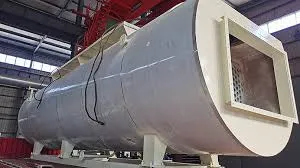Exploring Manual Feeding Boiler Options for Enhanced Efficiency and Performance in Industrial Applications
Manual Feeding Boiler Products A Comprehensive Overview
In the world of heating and energy production, manual feeding boilers hold a significant place. These time-tested systems are characterized by their simplicity and efficiency. Often favored in various industrial and agricultural applications, they provide reliable steam and heating solutions using solid fuels. This article will discuss the primary features, advantages, and applications of manual feeding boilers, as well as considerations for selecting the right product for your needs.
What is a Manual Feeding Boiler?
A manual feeding boiler is a type of boiler that requires manual loading of fuel, typically solid fuels such as wood, coal, or biomass. Unlike automatic feeding systems that use conveyers or stokers to supply fuel, manual feeding boilers rely on operators to feed the fuel into the combustion chamber. This straightforward operation makes them an excellent choice in settings where fuel supply systems are either impractical or too costly to implement.
Features of Manual Feeding Boilers
1. Simplicity and Cost-Effectiveness Manual feeding boilers are generally less expensive than automated systems. They require fewer technological components and can be easier to maintain due to their simpler design. This simplicity also translates to lower initial investment costs for businesses.
2. Fuel Versatility These boilers can burn various types of solid fuels, allowing users to choose from a wide range of fuel sources based on availability and cost. This versatility can lead to significant savings, especially in rural areas where biomass is readily available.
3. Robust Construction Manual feeding boilers are typically built to withstand the rigors of high-temperature operations. Many models feature durable materials and construction techniques designed to ensure longevity and reliability, making them suitable for a variety of applications.
4. Flexibility and Control Operators have direct control over the fuel input, allowing for adjustments based on operational needs. This can be beneficial in applications that require variable heat output, enabling a tailored approach to energy management.
Advantages of Manual Feeding Boilers
The benefits of manual feeding boilers extend beyond their design features
manual feeding boiler products

- Low Operating Costs Reduced fuel costs, especially when using locally available biomass or waste wood, can significantly decrease overall operating expenses.
- Minimal Technical Expertise Required Operation does not demand extensive training, making it accessible for personnel without specialized skills.
- Lower Environmental Impact With the ability to use renewable biomass sources, manual feeding boilers can be a more environmentally friendly choice compared to fossil fuel alternatives.
Applications
Manual feeding boilers find applications in various industries
- Agriculture Farmers often utilize manual feeding boilers for space heating in barns, greenhouses, and processing facilities. The ability to utilize agricultural waste as fuel enhances sustainability.
- Food Processing In food processing plants, steam boilers are essential for cooking, sterilization, and drying processes. Manual feeding systems can provide reliable heat without the need for complex automation.
- Small Industries and Craftsmanship Artisans, carpenters, and small manufacturers benefit from the simplicity and low cost of manual feeding boilers, allowing them to efficiently manage heating needs without incurring heavy expenses.
Conclusion
Manual feeding boilers are a practical and efficient solution for various heating and steam generation needs. With their low initial costs, flexibility in fuel choice, and straightforward operation, they are an excellent option for industries looking to optimize their energy use while minimizing costs. As we move towards a more sustainable future, the ability to use biofuels in these systems is a significant advantage, aligning with global efforts to reduce carbon footprints and promote renewable energy sources. Whether in an agricultural setup or a small manufacturing plant, manual feeding boilers continue to play a vital role in efficient energy management.
-
Top Industrial Boiler Contractors Supplier & Factory Quality Products & ServicesNewsJun.10,2025
-
Panasonic Hot Water Boiler - Reliable & Energy Efficient Heating SolutionNewsJun.10,2025
-
Pennco Steam Boilers High-Efficiency & Durable SolutionsNewsJun.10,2025
-
Industrial Boiler & Mechanical Solutions Efficient Industrial Heating SystemsNewsJun.10,2025
-
Panasonic Hot Water Boiler - Energy-Efficient, Reliable Heat SolutionNewsJun.10,2025
-
Premium Power Plant Steam Boilers High Efficiency & ReliabilityNewsJun.09,2025

